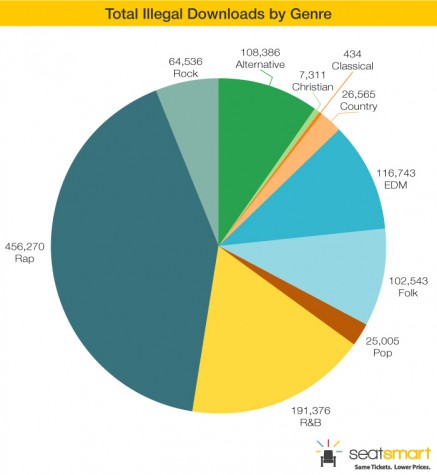The true cost of illegal downloading
March 18, 2016
In this day and age, physical copies of music are not as popular as buying music digitally. However, some individuals take an extra step and illegally download music from torrent sites and various apps. Many people argue that illegally downloading music is no different than walking into a store, slipping a CD into your pocket and leaving.
Since most people are downloading comfortably from their phones and computers, it seems like it would not cause that much harm. In 1995 and 1996, music sales brought in more than $40 billion, but in 2014 music sales brought in only $15 billion, according to Digital Music News. The decrease in profits shows that pirating has caused a big change in the music industry. In America, more than 70,000 jobs have been lost due to the lack of revenue that was supposed to come from music sales.
In 2015, around 20 million Americans admit to illegally downloading music. America is the number one country with illegal downloads, and the United Kingdom is following close behind. Just like someone who stole from a store, people can be prosecuted for illegally downloading music. The fines range from $750 to $150,000 per song. In any given year, music downloaders have a 1/8129 chance of getting prosecuted for their actions.
 Since 2009, the amount of fines and lawsuits against illegal music downloaders have dropped, but there is still a possibility of being caught. Most of the individuals who get fined are the people who download mass amounts of music and make websites to continue giving away free music. They make profits by providing ad space for companies, so everyone gets money, except for the original artist.
Since 2009, the amount of fines and lawsuits against illegal music downloaders have dropped, but there is still a possibility of being caught. Most of the individuals who get fined are the people who download mass amounts of music and make websites to continue giving away free music. They make profits by providing ad space for companies, so everyone gets money, except for the original artist.
On a Twitter poll, 72% of people admitted to illegally downloading music while 28% said no. Many artists say that illegally downloading music is not that big of a problem.
Dave Grohl, guitarist and singer for the Foo Fighters, stated in an interview with Upvenue.com “I think it’s a good idea because it’s people trading music. It has nothing to do with industry or finance, it’s just people that want music and there’s nothing wrong with that. It’s the same as someone turning on the radio, it’s the same as someone putting a cassette in a cassette deck when the BBC plays a special radio session. I don’t think it’s a crime, it’s been going on for years. It’s the same as people making tapes for each other.”
Artists don’t necessarily rely on sales from websites like iTunes, a majority of their money can be gained from ticket sales and merchandise. Although many artists don’t mind their fans illegally downloading music, the companies they work for can still fine people for their actions. Although the chances of having a lawsuit are quite low, the fines can quickly become a burden.








